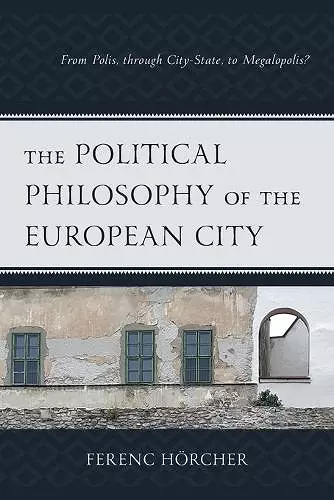The Political Philosophy of the European City
From Polis, through City-State, to Megalopolis?
Format:Paperback
Publisher:Bloomsbury Publishing PLC
Published:15th Mar '23
Currently unavailable, and unfortunately no date known when it will be back
This paperback is available in another edition too:
- Hardback£94.00(9781793610829)

The Political Philosophy of the European City is a courageous and wide-ranging panorama of the political life and thought of the European city. Its novel hypothesis is that modern Western political thought, since the time of Hobbes and Locke, underestimated the political significance and value of the community of urban citizens, called ‘civitas’, united by local customs, or even a formal or informal urban constitution at a certain location, which had a recognizable countenance, with natural and man-made, architectural marks, called ‘urbs’. Recalling the golden age of the European city in ancient Greece and Rome, and offering a detailed description of its turbulent life in the Renaissance Italian city-states, it makes a case for the city not only as a hotbed of modern democracy, but also as a remedy for some of the distortions of political life in the alienated contemporary, centralized, Weberian bureaucratic state. Overcoming the north-south divide, or the core and periphery partition, the book’s material is particularly rich in Central European case studies. All in all, it is an enjoyable read which offers sound arguments to revisit the offer of the small and middle-sized European town, in search of a more sustainable future for Europe.
“Through a skilled analysis of a very rich amount of sources and literature, from the ancient classics to contemporary writers and scholars, Ferenc Hörcher claims that because of the variety of the strong roots of the European cities they could return to be sustainable self-governing communities.” -- Mario Ascheri, Roma Tre University
Hörcher’s approach could be described as historical, as he walks the reader through a narrow history of experience, thought, and practice of European polis life. His distinction between the urbs and the civitas undergirds the analysis of life in the European city, be it twentieth century Buda, ancient Athens, or early modern Geneva. The urbs are pivotal to understanding the aims and conventions of city life. They provide a window into the civitas. For it is the latter that expresses itself, for better or worse, in the former… Hörcher’s tour starts in contemporary Buda and works backwards through Renaissance Florence, Venice, and Siena, the Germanic cities of the Holy Roman Empire, medieval Europe, to Plato’s and Aristotle’s Athens. The latter isn’t, by any means, meant to be a climax. Hörcher is no Whig historian in reverse. Rather, his conviction is that by looking for patterns of practice, conduct, and understanding in the cities of Europe, we ought to be able to discern wisdom for today. * Kirk Center *
ISBN: 9781793610843
Dimensions: 228mm x 151mm x 23mm
Weight: 445g
298 pages